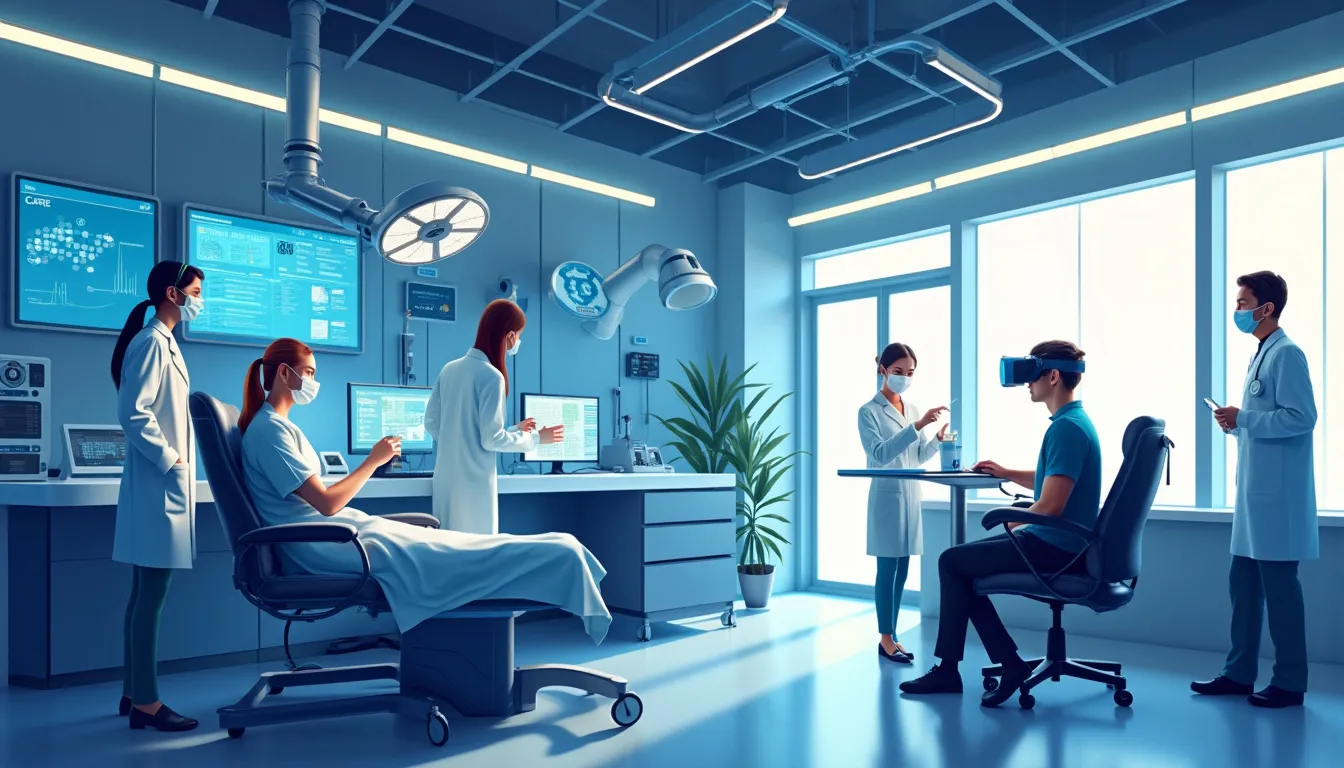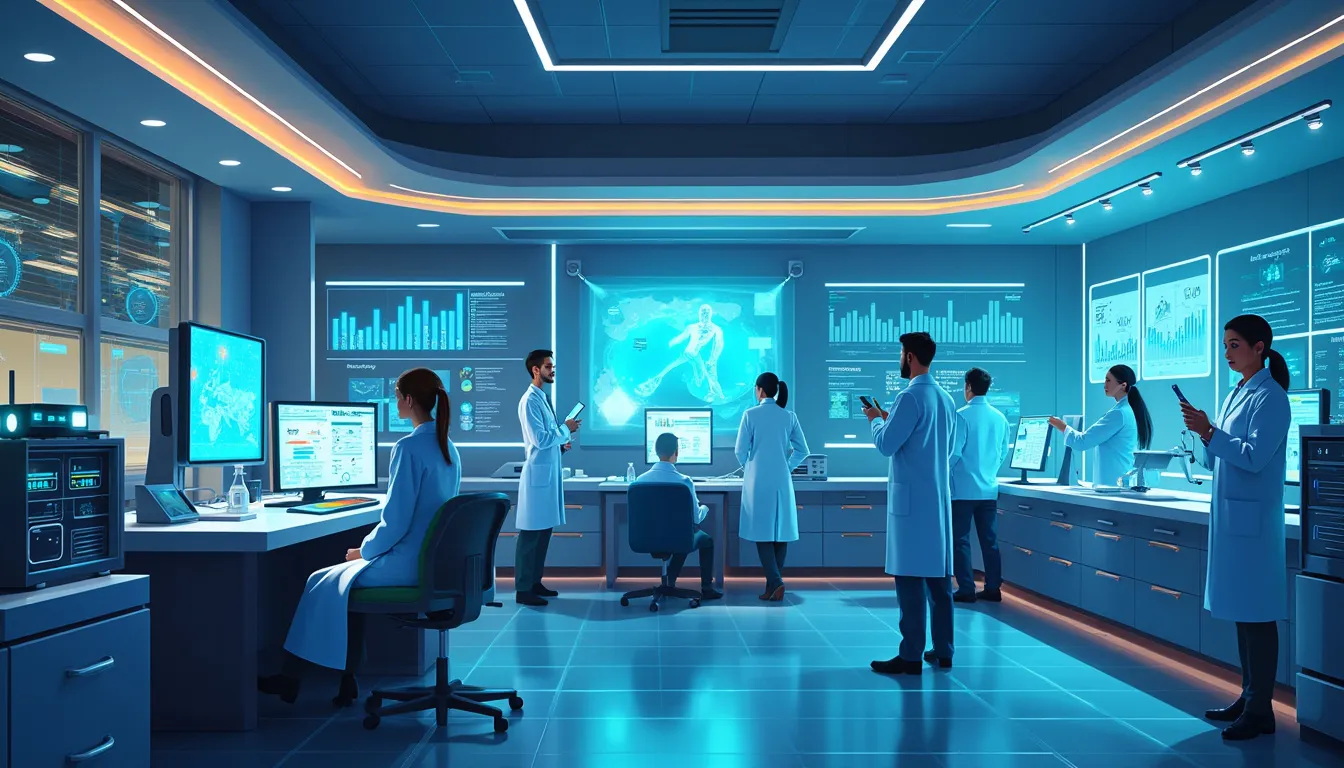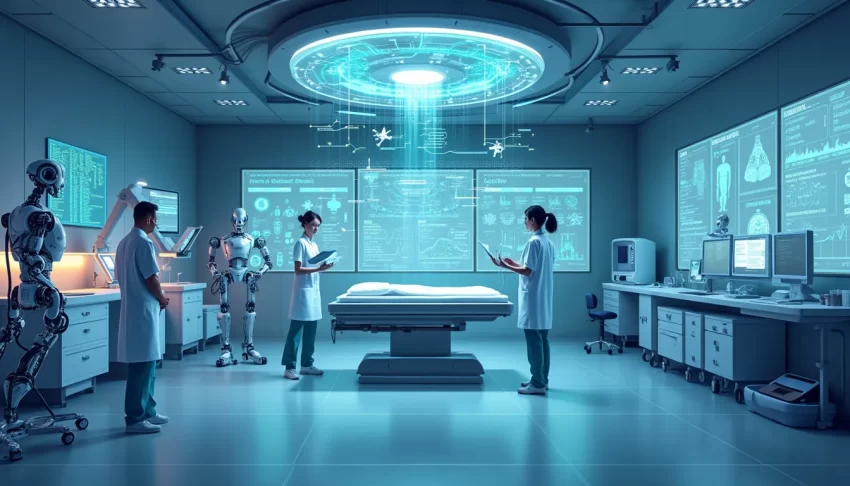As we stand on the brink of a medical revolution, the future of AI in healthcare promises transformative advancements that could redefine patient care and operational efficiencies across the industry. Currently, artificial intelligence is already making waves with its ability to enhance diagnostic accuracy and streamline administrative tasks. From machine learning algorithms that predict patient outcomes to sophisticated imaging systems capable of detecting diseases at their earliest stages, AI’s footprint in today’s healthcare landscape is undeniably significant. However, these innovations are just the tip of the iceberg. The potential impact of AI on medical practices is poised to be nothing short of groundbreaking.
The future of AI in healthcare is not just a subject of speculation but a reality within reach. Imagine a world where AI-powered tools assist surgeons in performing complex procedures with unprecedented precision, reducing recovery times and improving patient outcomes. Visualize personalized treatment plans crafted uniquely for each patient, thanks to AI’s capacity to analyze vast datasets and identify the most effective therapies. These scenarios, once confined to the realm of science fiction, are rapidly becoming tangible possibilities.
As we delve deeper into the intricacies of this evolving field, it becomes evident that the integration of AI holds the potential to revolutionize healthcare delivery globally. However, this journey is not without its challenges. Ethical considerations, particularly around data privacy and the potential biases in AI decision-making, must be meticulously addressed. Moreover, the technical hurdles associated with the implementation of AI systems require robust and standardized regulations to ensure consistency and safety across the board.
Nevertheless, the promise of AI in healthcare extends far beyond overcoming these obstacles. The potential for predictive analytics to detect diseases early, the fusion of AI with IoT and blockchain for secure and efficient data management, and the expansion of telemedicine capabilities signal a future where AI doesn’t just augment existing practices but fundamentally reshapes them. The future of AI in healthcare is an exciting frontier, one that holds the promise of not only improving individual health outcomes but also reinventing the very fabric of our global healthcare systems. As we chart this course, it is imperative that we navigate with foresight, innovation, and a steadfast commitment to ethical standards.
Introduction to The Future of AI in Healthcare
The future of AI in healthcare is an exciting and transformative journey, marking a significant departure from traditional medical practices. Currently, artificial intelligence is making remarkable strides in various facets of healthcare, bearing promising results that suggest a profound impact on the industry. Understanding the ongoing advancements and future possibilities paves the way for appreciating the potential that AI holds in revolutionizing medical practices.
Brief Overview of Current AI Applications in Healthcare
Presently, AI applications in healthcare are diverse and multifaceted, encompassing areas such as diagnostics, treatment recommendations, patient monitoring, and administrative efficiencies. Machine learning algorithms analyze vast quantities of medical data to identify patterns and correlations that would be nearly impossible for humans to detect in a timely manner. For instance, AI-powered imaging technologies can detect early signs of diseases like cancer with greater accuracy and speed than traditional methods. Additionally, virtual health assistants enhance patient engagement by providing 24/7 support and personalized care recommendations.
Consider the recent advances in natural language processing (NLP). NLP algorithms sift through medical literature and patient records to offer evidence-based treatment suggestions. Similarly, predictive analytics are employed to anticipate patient readmissions, enabling preemptive interventions that significantly enhance patient outcomes. Overall, these technological marvels underscore the transformative power of AI in healthcare, setting the stage for future innovations.
Importance and Potential Impact of AI on Medical Practices
Transforming medical practices through AI is not just a fanciful concept; it is a burgeoning reality with tangible benefits. The future of AI in healthcare is poised to address some of the most pressing challenges in the industry, from optimizing the diagnostic process to enhancing patient outcomes. The integration of AI can mitigate human error, streamline procedures, and facilitate early intervention, ultimately leading to cost savings and improved quality of care. A study by Accenture estimates that AI applications could potentially save the U.S. healthcare economy up to $150 billion annually by 2026.
On a more personal note, my journey in navigating ADHD and OCD has given me a unique perspective on how AI can democratize access to mental health services. Advanced AI tools can monitor behavioral patterns, providing timely interventions and personalized therapy sessions, thus facilitating continuous care and alleviating the burden on healthcare providers. Such innovations attest to AI’s potential to enhance patient experiences and clinical outcomes through innovative solutions.
Moreover, AI’s role isn’t confined to patient care alone. It holds transformative potential for medical education and training. Virtual simulations powered by AI provide budding medical professionals with hands-on practice and decision-making scenarios, indispensable for honing their skills without exposing real patients to risk. This technology ensures a well-prepared healthcare workforce ready to tackle complex medical challenges.
Introduction of Keyword: The Future of AI in Healthcare
The future of AI in healthcare is a topic that’s gaining traction, and for good reason. As we contemplate the next steps in this rapidly evolving field, it is crucial to recognize that AI is no longer a distant dream but a present-day reality with far-reaching implications. From ensuring more accurate diagnostics to enabling personalized treatment plans, AI’s potential to transform healthcare is unparalleled. Drawing on my extensive experience in both AI and safety illustrates how these technological advancements can be implemented securely and effectively across various healthcare settings.
However, the path to integrating AI into healthcare systems is not without its challenges. Ensuring data privacy, addressing ethical dilemmas, and overcoming technical hurdles are critical to navigating this transformation. Furthermore, healthcare providers must maintain the delicate balance between leveraging AI’s capabilities and preserving the human touch that is essential to patient care. By understanding and addressing these considerations, we can fully harness the potential of AI to advance medical practices and improve patient outcomes.
As we delve deeper into the future of AI in healthcare, it is vital to stay informed and prepared to adapt to the continual changes that this field will bring. By staying proactive and open to innovative solutions, we can collectively shape a future where AI serves as a cornerstone of a more effective, efficient, and patient-centered healthcare system.

Current Innovations and Applications of AI in Healthcare
The advancements in the world of Artificial Intelligence (AI) have been nothing short of revolutionary, especially in the field of healthcare. From diagnostics and imaging to AI-assisted surgery and robotics, the current innovations are paving the way for a more efficient and accurate medical practice. Let’s take a closer look at how these technologies are shaping our present and hinting at the future of AI in healthcare.
AI in Diagnostics and Imaging
Arguably, one of the most impactful applications of AI in healthcare today is in the realm of diagnostics and imaging. Traditionally, diagnosing conditions like cancer often required extensive testing and could be delayed by human error or a lack of specialized expertise. AI is changing that narrative.
For instance, AI algorithms can now analyze medical images with remarkable precision. Take the case of early-stage breast cancer detection. Machine learning models trained on thousands of mammograms can identify early signs of cancer, often with greater accuracy than human radiologists. Real-world examples, such as Google’s DeepMind, demonstrate how AI can flag issues in medical scans that may go unnoticed by even the most trained eye. This level of accuracy not only speeds up diagnosis but also significantly improves patient outcomes.
AI-Assisted Surgery and Robotics
Another groundbreaking application of AI in healthcare is its integration into surgical procedures. Robotic surgery, assisted by AI, allows for unprecedented precision and control. Consider the da Vinci Surgical System, a well-known robotic platform employing AI to assist surgeons in performing minimally invasive procedures. This technology is not just a theoretical exercise; it’s making a tangible difference in operating rooms worldwide.
One compelling example is its use in complex procedures such as prostatectomies or cardiac valve repairs. The AI systems provide real-time data and analytics, guiding surgeons through intricate steps. The enhanced dexterity and reduced error rates lead to faster recovery times and less postoperative pain for patients. For those of us managing personal health challenges, like my own journey with ADHD and OCD, the peace of mind knowing that AI can handle such sophisticated tasks effectively is genuinely reassuring.
Personalized Medicine and Treatment Plans
Beyond diagnostics and surgery, AI is revolutionizing personalized medicine. The days of one-size-fits-all treatment plans are becoming a relic of the past as AI enables more tailored approaches. By analyzing vast datasets, including genetic, lifestyle, and environmental factors, AI can predict how different patients will respond to various treatments.
Take, for example, the use of AI in managing chronic conditions like diabetes. Machine learning algorithms can create individualized treatment plans by analyzing a patient’s unique biological markers and lifestyle data. This could mean the difference between generic medication dosages and personalized regimens that optimize efficacy while minimizing side effects. This isn’t just speculative; companies like IBM Watson Health are already deploying such AI systems in clinical trials and real-world settings.
How AI is Improving Patient Care and Operational Efficiency
AI’s role isn’t confined to medical procedures and treatment plans; it extends to overall patient care and the operational efficiencies of healthcare facilities. Patient care coordination has traditionally been a tangled web of appointments, follow-ups, and record-keeping. AI simplifies this by automating administrative tasks and providing a seamless integration of patient data.
Consider an AI-driven platform that can predict patient no-shows based on historical data and current conditions, thereby optimizing appointment schedules. This might sound trivial, but the efficiency gains can be significant, reducing waiting times and improving the patient experience. As someone who has experienced the frustration and disorganization of medical appointments while managing multiple conditions like ADHD and OCD, the promise of AI-driven coordination is both a relief and a revelation.
Similarly, AI algorithms in Electronic Health Records (EHR) can flag potential medication errors, alert healthcare providers to patient deterioration risks, and even assist in emergency triage. For example, predictive analytics can assess which patients in an emergency department are likely to require intensive care, allowing for better resource allocation and quicker intervention.
The real-world value of these innovations is directly reflected in metrics like reduced hospital readmissions, lower operational costs, and improved patient satisfaction scores. From personal experience, managing my weight loss journey with AI-driven health apps has not only made the process more reliable but also more engaging. These apps offer real-time advice and adjustments, which are invaluable when dealing with the nuances and fluctuations of daily life.
The current landscape of AI in healthcare showcases its multifaceted capabilities and promises tremendous advancements. Whether it’s through enhancing diagnostic accuracy, assisting in complex surgeries, personalizing treatment plans, or boosting operational efficiencies, AI is already rewriting the rules of medical practice. The future of AI in healthcare is not a distant dream but a present-day reality that’s continually evolving, offering a glimpse into a more advanced and humane healthcare system.

Challenges and Ethical Considerations
Data Privacy and Security Issues
The rapid integration of AI in healthcare raises significant concerns regarding data privacy and security. As AI systems require vast amounts of data to function effectively, ensuring the confidentiality and integrity of patient information becomes paramount. One prominent case illustrating this challenge involves a healthcare provider’s data breach, where sensitive patient information was exposed due to inadequate security measures. This incident underscores the urgent need for robust data protection protocols to prevent unauthorized access and maintain trust in the systems designed to protect us.
Moreover, the future of AI in healthcare hinges on the development of advanced encryption techniques and stringent access controls. Healthcare institutions must adopt proactive measures to secure data storage and transmission processes. Balancing the dual demands of leveraging big data for AI advancements while protecting patient privacy remains a daunting task for the industry.
Ethical Dilemmas in AI Decision-Making
AI decision-making, while potentially life-saving, also presents complex ethical dilemmas. The algorithm’s capability to predict patient outcomes often surpasses human intuition, which can result in ethical gray areas. For instance, how should AI systems handle end-of-life decisions or prioritize care during resource shortages?
A personal anecdote can be illustrative here: in my experience working with AI-driven diagnostic tools, I witnessed an incident where the AI recommended a treatment path significantly different from the physicians’ initial consensus. While the algorithm was technically correct, the patient’s unique circumstances warranted a more nuanced approach. This scenario exemplifies the critical need for human oversight to ensure that AI recommendations complement, rather than replace, the human touch in healthcare.
Further, the implementation of ethical guidelines and frameworks is essential for navigating these dilemmas. Developing algorithms with transparency and accountability allows healthcare providers to better understand the basis of AI-derived recommendations, ultimately fostering trust and ethical compliance.
Technical Challenges and the Need for Standardized Regulations
Technical challenges also pose significant hurdles in the journey towards the future of AI in healthcare. The complexity of integrating AI into existing healthcare systems often leads to incompatibility issues, slowing down the adoption process. One example of this is the difficulty in standardizing medical imaging data across different institutions, which can stymie the development of universally applicable AI diagnostic tools.
Standardized regulations are crucial to overcoming these technical challenges. The establishment of common protocols and interoperability standards can facilitate smoother integration and encourage widespread adoption of AI technologies. Furthermore, regulatory bodies must ensure that AI systems undergo rigorous testing and validation processes before deployment, safeguarding patient safety and promoting efficacy.
In my career, I’ve found that collaboration between AI developers and healthcare providers is vital to address these technical challenges. By working together, we can design systems that meet clinical needs while adhering to regulatory standards, paving the way for seamless and effective AI integration.
The Role of Human Oversight and the Importance of Maintaining Trust in AI Systems
The importance of human oversight cannot be overstated in the future of AI in healthcare. Despite rapid advancements, AI systems are not infallible and can make errors or produce biased outcomes. Human oversight ensures that these systems augment rather than override clinical judgment.
An anecdote from my professional journey illustrates this well. While implementing an AI-driven triage system, there was an instance where the algorithm misclassified a critical patient’s condition due to skewed training data. Thanks to vigilant healthcare professionals who cross-checked the AI’s recommendations, the error was caught and rectified swiftly, averting potential harm.
Trust in AI systems is built through consistent accuracy, transparency, and the reassurance that human expertise remains central to decision-making processes. Training programs for healthcare professionals on the effective use of AI tools can bolster this trust, ensuring that both patients and practitioners are confident in their use.
Furthermore, it’s crucial to foster an environment where feedback from clinicians informs the continuous improvement of AI systems. This iterative approach not only enhances system reliability but also ensures that AI tools remain attuned to the evolving realities of clinical practice.
In conclusion, addressing the challenges and ethical considerations in AI integration is fundamental to realizing its full potential in healthcare. By prioritizing data privacy, ethical AI deployment, overcoming technical barriers, and reinforcing human oversight, we can pave the way for a future where AI profoundly enhances medical practices while maintaining the trust and safety of all stakeholders.

Future Prospects and Innovations
Predictive Analytics and Early Disease Detection
The future of AI in healthcare is intrinsically linked to its capability to predict outcomes and detect diseases at early stages. Predictive analytics, powered by artificial intelligence, can analyze vast datasets to anticipate potential health issues before they become critical. For instance, AI algorithms have demonstrated remarkable accuracy in predicting the onset of conditions like diabetes, heart disease, and even certain cancers by identifying subtle patterns in patient data that human practitioners might overlook.
A compelling example of this is the use of AI in predicting diabetic retinopathy. By analyzing retinal images with machine learning algorithms, AI systems can detect early signs of the disease, often before symptoms manifest, thus allowing for timely intervention and treatment. Such predictive capabilities not only improve patient outcomes but also significantly reduce healthcare costs associated with managing advanced-stage diseases.
Integration of AI with Other Emerging Technologies: IoT and Blockchain
The convergence of AI with other cutting-edge technologies such as the Internet of Things (IoT) and blockchain promises to revolutionize healthcare. IoT devices, including wearable health monitors and smart medical devices, generate continuous streams of data that, when analyzed by AI, can provide real-time insights into a patient’s health. For example, wearable fitness trackers that monitor vital signs can alert healthcare providers to potential health anomalies, leading to proactive care and prevention measures.
Blockchain technology complements AI by offering secure and transparent ways to store and share medical data. The immutable nature of blockchain ensures that data integrity is maintained, which is critical for the accuracy of AI analyses. Together, AI and blockchain can streamline administrative processes, enhance data security, and enable a seamless flow of information across different healthcare systems. This integrated approach is particularly beneficial in managing patient records, ensuring that healthcare providers have access to accurate and up-to-date information, ultimately improving the quality of care.
The Potential of AI in Telemedicine and Remote Care
As telemedicine becomes a staple of modern healthcare, the future of AI in healthcare will see significant advancements in remote patient monitoring and virtual consultations. AI-powered virtual assistants and chatbots are already helping patients manage their health from the comfort of their homes by providing medical advice, scheduling appointments, and even monitoring medication adherence.
Anecdotal evidence showcases the transformative power of AI in remote care scenarios. For example, during the COVID-19 pandemic, AI-driven telehealth platforms played a crucial role in minimizing the burden on healthcare facilities by enabling remote consultations and continuous patient monitoring. Advanced AI algorithms can analyze data from remote monitoring devices to detect early signs of deterioration in chronic disease patients, ensuring timely medical intervention and preventing hospital readmissions.
Moreover, AI’s capacity to analyze complex datasets and extract meaningful insights can enhance the diagnostic accuracy of virtual consultations. Radiologists, for instance, can leverage AI tools to interpret medical images remotely, accelerating the diagnostic process and ensuring that patients receive prompt and accurate care, regardless of their geographical location.
Long-Term Vision: How AI Might Reshape Global Healthcare Systems
The long-term vision for the future of AI in healthcare is nothing short of revolutionary. As AI technologies continue to evolve, they have the potential to reshape entire healthcare ecosystems globally. One promising development is the creation of AI-driven health networks that enable seamless collaboration and knowledge-sharing among healthcare professionals worldwide.
Imagine a world where AI systems can aggregate anonymized health data from diverse populations to identify global health trends and potential outbreaks of diseases. Such systems could provide early warnings and inform public health strategies, potentially preventing the spread of pandemics and improving global health security. Additionally, AI could play a pivotal role in addressing healthcare disparities by providing high-quality medical insights to regions with limited access to healthcare professionals.
The implementation of AI in global healthcare systems also involves rethinking medical education and training. AI-powered simulation and training programs can equip healthcare professionals with the skills needed to work alongside intelligent systems, ensuring a harmonious integration of human expertise and machine intelligence. This synergy will drive medical innovation, improve patient outcomes, and pave the way for a more efficient and equitable healthcare landscape.
While the journey towards fully realizing the potential of AI in healthcare is filled with challenges, the promising prospects outlined above highlight the transformative impact that AI can have on medical practices. By embracing AI-driven innovations and addressing associated ethical and technical challenges, the healthcare industry can look forward to a future where advanced technologies not only augment human capabilities but also foster a healthier and more accessible world.
As we stand on the precipice of a new era in healthcare, the future of AI in healthcare holds immense promise and possibilities. The advancements in AI technologies have already begun to revolutionize diagnostics, imaging, and personalized treatment plans, significantly improving patient outcomes and operational efficiencies. From AI-assisted surgeries that enhance precision to personalized medicine that tailors interventions according to individual genetic profiles, the future of AI in healthcare is now becoming our present.
However, as we embrace the transformative potential of AI, it is vital to navigate the associated challenges with diligence and care. Addressing concerns around data privacy, ensuring robust security measures, and establishing ethical frameworks for AI decision-making are paramount. The technical hurdles and the need for standardized regulations should not be overlooked, as these are critical to maintaining the safety and trustworthiness of AI systems. Indeed, human oversight remains an indispensable component, guaranteeing that this technology serves humanity with integrity and altruism.
Looking ahead, the fusion of AI with emerging technologies like the Internet of Things (IoT) and blockchain can usher in an even more interconnected and efficient healthcare ecosystem. Predictive analytics could pave the way for early disease detection, dramatically altering patient prognoses and reducing healthcare costs. Furthermore, AI’s role in telemedicine and remote care is set to expand, offering unprecedented access to medical services, especially in remote and underserved regions.
In essence, the future of AI in healthcare is not just about technological advancement; it is about enhancing the human experience, extending the reach of medical expertise, and bringing about a profound shift in how we perceive and engage with health and well-being. As we move forward, let’s harness the power of AI to create a healthier world. With a collaborative approach, continuous learning, and a commitment to ethical practices, we can unlock AI’s full potential and achieve breakthroughs that were once the realm of science fiction.
So, whether you are a healthcare professional, a tech enthusiast, or someone who simply wants to see a better tomorrow, now is the time to engage with and advocate for the responsible integration of AI in healthcare. Let’s build a future where AI not only transforms medical practices but also augments the very essence of human care and compassion. Together, we can turn the vision of a technologically enhanced healthcare system into a reality.
Support Us: Check out our recommended products on Amazon.

